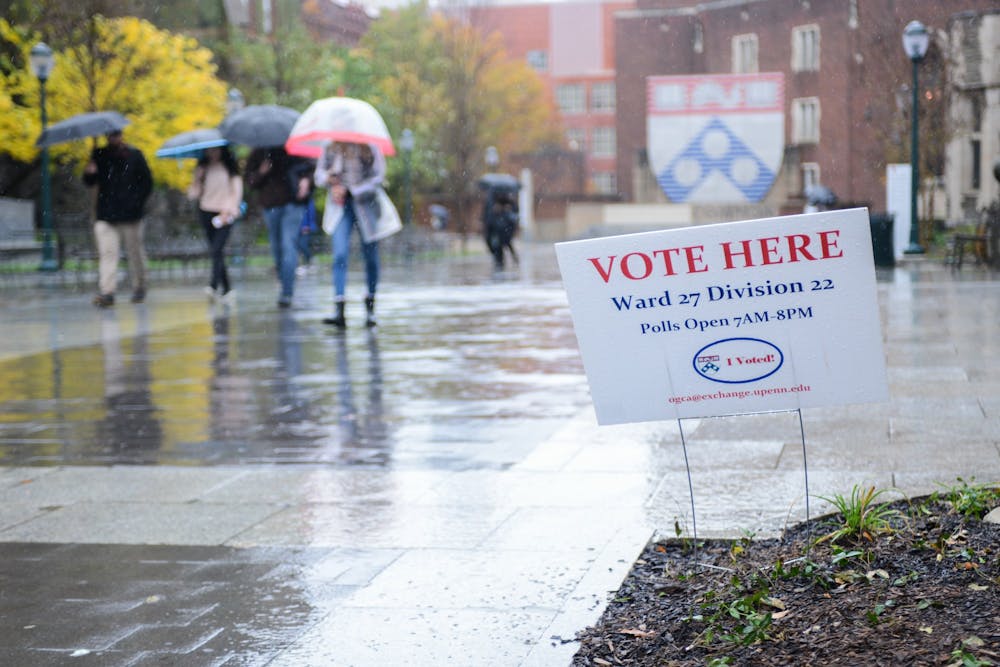
Houston Hall Bodek Lounge is one of the polling locations on Penn's campus.
Credit: Zach SheldonAfter months of campaigning, Election Day has finally arrived.
Although Pennsylvanians have been casting their ballots for over a month through early and mail-in voting, today voters can head to the polls in person. For those who have not yet voted by mail and plan to do so, mail ballots must be returned by 8 p.m. at a designated ballot drop box. For those who wish to vote in person, polling locations are open from 7 a.m. to 8 p.m. Mail ballots cannot be returned at polling locations.
Here is everything you need to know about how and where to vote on campus, as well as who and what is on the ballot:
What if I requested a mail ballot but now want to vote in person?
Act 12, an emergency law passed by the Pa. legislature in March, allows voters who requested a mail ballot to still vote in person. Just bring the ballot and the envelope, hand it to the poll workers, and they will allow you to cast your vote on a polling machine.
Voters who never received their mail-in ballot can still vote in person using a provisional ballot. Provisional ballots will be counted after Election Day to ensure that voters in fact did not submit a mail-in ballot.
How and where can you vote on Election Day?
Registered Pennsylvania voters can find their designated polling location here. The polling locations closest to Penn's campus are Houston Hall Bodek Lounge, the ARCH Building Room 108, and Walnut Street West Library on 39th and Walnut streets.
Voters do not need a photo ID unless they are a first-time voter in a certain district. If you are a first-time voter, a list of Pennsylvania's approved identification can be found here. Student IDs are acceptable.
Who – and what – is on the ballot in Philadelphia?
Outside of the race for president between former Presidential Professor of Practice Joe Biden and 1968 Wharton graduate Donald Trump, the Democratic and Republican nominees respectively, Philadelphians will also be voting for Pa. Attorney General, Auditor General, State Treasurer, and Congress as well as on four ballot initiatives.
The races for Attorney General, State Treasurer, and Philadelphia's three Congressional districts feature an incumbent Democrat with challengers from one or all of the Republican, Libertarian, and Green parties.
In the state senate, Philadelphians will be voting for one of four unopposed Democrats, depending on where voters live within the city. In the state house, voters in Penn's district – the 188th district – Democrat Rick Krajewski is running unopposed. In June's primary, Krajewski beat beat incumbent Jim Roebuck, who had been in the position for 35 years.
Voters will also be faced with four ballot questions.
Question one asks if voters the Police Department should be required to eliminate the practice of unconstitutional stop and frisk. Question two asks voters if the city should form the Office of the Victim Advocate, which would advocate for crime victims and work with victim services providers to coordinate, plan, train, educate, and investigate issues relating to crime victims. Question three poses the question of whether or not the city shall create a Citizens Police Oversight Commission. Question four asks voters if the City of Philadelphia should borrow $134 million for capital purposes including transit, sanitation, municipal buildings, parks, and museums.
What is at stake?
Pennsylvania is a state that could decide the presidential election. Trump, who is trailing Biden nationally and in Pennsylvania, has suggested he would pursue legal action to prevent the commonwealth from counting ballots that are received up to three days after Election Day. The Supreme Court, however, has ruled that these ballots can be counted in the state.

When can you expect results for the presidential race?
Pennsylvania election officials, unlike those in other states, are not allowed to open mail-in ballots before in-person voting begins, causing many counties to delay starting the vote count until Wednesday.
Philadelphia and neighboring suburbs intend to start as soon as legally possible. Officials plan to release a first count of mail-in ballot results in Philadelphia, the county with the highest number of mail-in ballots requested in Pennsylvania, shortly after the polls close at 8 p.m. A second count is expected later in the night after a majority of the in-person results have been counted.
On Nov. 4, updates are expected to be released between 9:30 and 10 a.m., between 3:30 and 4 p.m., and between 9:30 and 10 p.m. After Nov. 4, election officials will post results twice a day to their website.
While Pennsylvania will likely only proclaim a winner of the presidential contest by the end of the week, there is a good chance voters will know in which direction the race is headed by the end of Election Day — even if neither candidate is able to secure the 270 electoral votes necessary to be formally elected.
Pennsylvania voters can expect election-night results, most of which comprise Election Day votes, to be disproportionately skewed Republican, and then shift blue as more mail-in ballots are counted throughout the day and into Wednesday morning.
The Daily Pennsylvanian is an independent, student-run newspaper. Please consider making a donation to support the coverage that shapes the University. Your generosity ensures a future of strong journalism at Penn.
Donate




